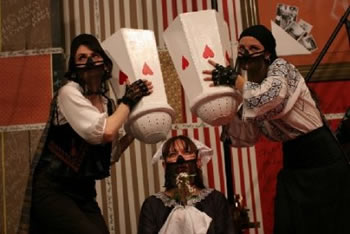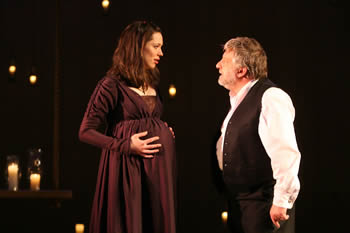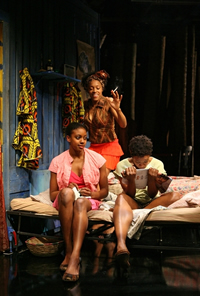HotReview.org Editor's
Picks
Shows Worth Seeing:

Astronome: A Night at the Opera
by Richard Foreman and John Zorn
The Ontological at St. Marks
131 E. 10th St.
Box office: 866-811-4111
Foreman’s new production, a first-ever collaboration
with the avant-garde composer John Zorn, was a revivifying experience
for me. In recent years, Foreman’s productions have been
experiments with film, attempts to incorporate provocatively static
and disjointed film sequences into the live action in a way that
stayed true to his desired experience of jarringly revelatory
“pearls” strung together in a sensorily heightened,
Gertrude Steinian continuous present. I’ve found the results
a bit disappointing. The recorded images sucked all the air out
of the room (as media always will), and Foreman, recognizing this,
tried to compensate by making that into a virtue. He pared and
slowed the live action almost to a catatonic stupor, but the stasis
wasn’t jarring or revelatory. It was dull, even though the
stages were as chockfull of fascinating clutter as usual. Astronome
has gone completely in the other direction. There is very little
text, but the score by Zorn—in his signature idiom of deafening
and cacophonous mixtures of clashing, screeching, wailing, and
driving rhythms (imagine an interminable Pink Floyd jam remixed
by an aggressive punk band)—supplies a propulsive energy
that wakes you up and keeps your mind wonderfully active. There
is much more activity by the seven-member cast than there has
been in the last five or six Ontological-Hysteric pieces, and
also more use of the props sprinkled about the stage. A man reaches
up into a nostril of the giant, chimney-like nose mounted on the
wall and picks out wadded paper boogers, which are then sniffed,
studied and worried over. Another actor is stuffed into the cutout
mouth beneath the nose. Someone dons a bizarre strawberry helmet-mask,
which someone else then greedily devours. Giant scissors are poised
to snip off actors’ noses. These gestures, coordinated with
Zorn’s pumping, anarchic rhythms, are weird and funny enough
to work as surrealism. Foreman’s recorded voice occasionally
intones “stage fright,” and near the end he mutters
some comments about a “new world.” But the enduring
strangeness doesn’t come from the language. It comes from
those manifestations of the Marvelous generated by the stage activity
and the score. This operatic path is a potentially very fruitful
one for Foreman. Here’s hoping he pursues it.
----------------------------------

The Winter's Tale
by William Shakespeare
BAM Harvey Theater
651 Fulton St., Brooklyn
Box office: 718-636-4100
New Yorkers should ignore any nonsense they may
have read about this Winter’s Tale being only half
realized. I’ve seen a half-dozen productions of this exceedingly
difficult play, and Sam Mendes’s is one of the best: touching,
funny, visually delightful, lucid and intelligent. There is a
bear of a staging problem at the heart of Shakespeare’s
text, and that is its unique bifurcated form. Its first half is
tragic, then it shifts abruptly to pastoral comedy, and then it
ends with a strange, quasi-supernatural finale that mixes all
the disparate characters and tones together. How to deal with
all the wrenching mood changes? How to make both the grave seriousness
and the knockabout foolishness convincing without sending the
pieces in such radically different directions that they end up
irreconcilable? Mendes answered these killer questions with aplomb.
The play’s serious Sicilia scenes are like a lost story
from 1001 Nights, staged intimately in a carpeted bedroom
with dozens of lanterns hanging behind a gauzy scrim. The silly
Bohemia scenes are like a lost story from Christopher Durang.
The long and absurd sheep-shearing festival that defeats most
directors has been wisely Americanized and postmodernized, filled
out with folksy western tropes and an over-the-top bawdy balloon
dance that clearly originated in improvisation, which is why it
leaves such a wonderful sense that the cast truly owns
the comedy. The play’s subtlest points become startlingly
clear in these environments: the possible attraction of the kings
for each other, for instance, and the surprise that the supposedly
good king, Polixenes, is potentially capable of the same impulsive
cruelty as his jealous and tyrannical friend Leontes. There is
one glaring casting goof in the role of Perdita, but otherwise
the acting is strong and in a few cases splendid. Rebecca Hall
is exquisite as the wronged queen Hermione, as is Sinead Cusack
as her fearless defender Paulina. Ethan Hawke gives the comic
cutpurse Autolycus vivid life as an endearingly incorrigible,
Bob Dylanesque balladeer. Simon Russell Beale is not an especially
compelling Leontes, mostly because his dumpy, unprepossessing
physique is too obvious an explanation for his jealousy (he can’t
see how gorgeous Hermione could love him). But he makes up in
realism what he lacks in mystery and depth, and there’s
a sort of adventitious profundity in his utter bafflement in the
final scenes. Unlike the rather uneven and unremarkable Cherry
Orchard, the Bridge Project's previous offering at BAM, this
Winter's Tale is a must-see event. No production of the
play is likely to show off its strengths this well for a very
long time.
--------------------------------

Ruined
By Lynn Nottage
Manhattan Theatre Club
NY City Center
131 W. 55th St.
Box office: (212) 581-1212
Ruined takes a while to get going. For
about fifteen minutes it seems worryingly like one of those painstakingly
researched, painfully earnest yet dramatically inert docudramas
about “troubled regions” that theatrically naive activists
schedule to lighten the atmosphere at human rights conferences.
It soon weaves a gripping dramatic web, though. Set in a brothel
in the contemporary Democratic Republic of Congo amid the endless
factional fighting there, it tells a story akin to Brecht’s
Mother Courage about a bar-owner-cum-madam who thinks
she can profit from the war without sacrificing much to it or
ever choosing sides. That’s the tale that Lynn Nottage wants
you to think she’s telling, anyway. The wrinkle is that
Mama Nadi’s supposedly amoral commercial enterprise also
serves a protective function. The brothel may be degrading but
it also saves its prostitutes’ lives because they are all
refugees from even worse danger and degradation. Nottage has no
interest in simple moral inversion, though. She presents a fascinating
array of extremely varied characters who make a range of different
choices for the sake of survival. In the end the audience must
weigh all those choices against the costs to the characters’
humanity. This is the tightest, most compelling drama based on
sociological “field research” I’ve seen in a
decade (Nottage traveled to the Congo and interviewed many women
there), yet there’s no documentary feel to it at all. Ruined
lives—thrives and sings—as drama, and that is its
most secure claim to the truth.
